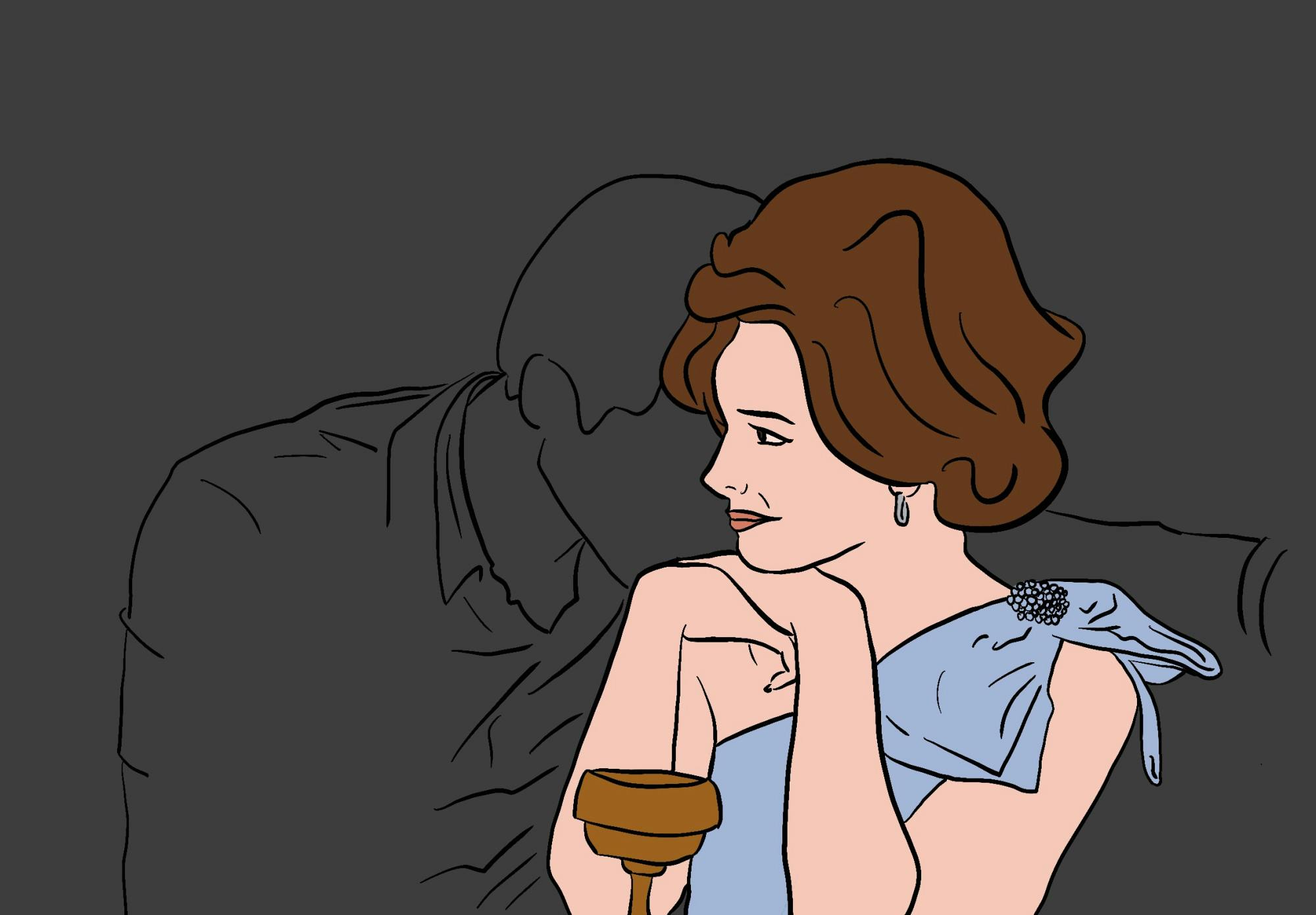A passage in the fourth chapter of the Book of John tells the story of Jesus approaching a Samaritan woman at a well. During their exchange, Jesus reveals himself to the woman — who is meant to represent the lowest class in society — as the son of God and offers her everlasting life. Standing at the well, he says, “Everyone who drinks of this water will thirst again, but whoever drinks of the water that I shall give will never thirst.”
Interestingly enough, these verses appear in a seemingly unlikely place for them to be — wedged between pink shag carpets and Aqua Net hairspray in Sophia Coppola’s new movie “Priscilla.” The passage is featured in a scene from Coppola’s source material for the movie, Priscilla Presley’s memoir entitled “Elvis and Me,” and the moment plays out on film almost exactly as it was written. Elvis is holding a bible study in his Bel Air home, reading the story of the Samaritan woman while being gawked at by beautiful women in miniskirts who clearly have more interest in the popstar than Jesus; a bothered Priscilla sits in the back ignored.
Even if you don’t have 11 years of Catholic school under your belt like I do, it’s plain to see why Coppola chose to feature a scene with this specific Bible passage; it perfectly captures the feeling of being chosen by God, or in Priscilla’s case, someone who was comparable to a god — Elvis Presley.
Priscilla famously met Elvis during his days in the army, while her stepfather, a U.S. Air Force officer, was stationed in West Germany. At the time they were introduced, she was 14 to Elvis’s 24. Upon learning this information, many find it easy to label Elvis as a “groomer”; however, Coppola’s handling of Priscilla’s story makes it clear that the director does not agree.
Though she constantly reminds the audience of the couple’s power dynamic — namely through the actors’s stark height difference or the fact Elvis calls Priscilla his “little girl” well into her 20s — Coppola approaches Elvis’s character with the same lack of judgment and enduring love that is captured in Priscilla’s memoir.
Empathizing with someone who is largely misunderstood is certainly easier when you have a personal history with them, like Priscilla did with Elvis, but it is a feat for an outsider like Coppola to translate this same complex understanding about such a mythological man onto the silver screen.
She overtly does so by exhibiting Elvis’s grief over the loss of his mother and his homesickness while serving in Germany. In a more subtle way, Coppola also illustrates Elvis’s lack of control in his own life through overheard phone conversations and passing comments about his manager Tom Parker, also known as “The Colonel.” Though he remains an off-stage character throughout Coppola’s adaptation, the Colonel’s ubiquitous control is present throughout the film, from the never-ending supply of pills that enable Elvis’s drug addiction to the corny movies Elvis is forced to star in, despite his desire to become a more serious actor.
Additionally, though there is a 10-year gap between the two lovers, they often seem the same age, like children playing adults. Elvis’s stunted maturity is most obviously seen when he is cheered on by his rowdy, omnipresent group of friends, such as when he knocks down a house in the back of Graceland with a small bulldozer, or when he and Priscilla get a kick out of shooting cans in the backyard.
The ever-present swarm of female fans Elvis attracts is also a reminder that it’s not hard to fall under the influence of a man at any age — whether that be 14, 28, 35 or otherwise — when men largely set and control the standards of society.
One would be remiss to leave out the circumstances in which Elvis and Priscilla met, but it would also be irreverent to refuse Elvis some understanding and reduce their relationship to perversion, especially when that is not how Priscilla herself views it. This is supposed to be her story, after all.
It’s actually hard to imagine anyone who could tell this narrative better than Sofia Coppola. When looking at the director’s body of work, it’s easy to see how this is a natural story for her, as “Priscilla” embodies all the major themes that Coppola has explored throughout her career. Presley’s story includes the harsh realities a woman must face when coming of age (as featured in “The Virgin Suicides” and “Marie Antoinette”), disillusionment with fame (“The Bling Ring” and “Lost in Translation”) and the complexities of desire (“The Beguiled”), to name a few.”
Coppola also adds a new layer to the story through her idiosyncratic use of music. Not a single Elvis song is featured in “Priscilla,” since his estate would not give Coppola the rights to use his music. However, in many ways, the film gains much more from a lack of his work than what it loses. Without the constant reminder of why Elvis was and still is unwaveringly adored, Coppola subverts the sensationalized portrait of Elvis and Priscilla to reveal a more grounded narrative centered around heartbreaking romance, isolation and control without the obstruction of his talent or mythology.
And although Coppola’s movie certainly breaks the surface, it is equally obsessed with material luxury. Before the audience sees Priscilla, they see her pink shag carpet; and throughout the film, we are bombarded with closeups of the trinkets that fill her teenage bedroom, photos that she attaches to her walls and an evolving collection of cosmetics.
Priscilla’s possessions seem to be at the forefront of the film almost as much as Priscilla, so it’s not hard to draw a line between her objects and her own objectification by Elvis. The moment Elvis and Priscilla reunite at Graceland, he whisks her off to a store where he handpicks what dresses she should buy, before telling her to dye her hair from a light brown to black and that she needs “more eye makeup.” Though his material items are not featured as prominently, Elvis’s opulence remains a constant in every scene at Graceland — from the pound of bacon on his breakfast plate to his monogrammed silk pajamas and the several tiger statues in his bedroom — further representing his obsession with controlling the things that he could within his life, which included Priscilla.
Despite the constant reduction of Priscilla by those around her, Cailee Spaeny gives anything but a two dimensional performance. Spaeny’s portrayal truly feels like watching a young girl grow up, in a way that I have never seen a single actor achieve in a film before; it’s surprising to remember she’s 24 when she plays 14-year-old Priscilla with such ease. Moreover, Jacob Elordi’s Elvis is a breath of fresh, vulnerable, complex air, especially in comparison to Austin Butler’s almost comical portrayal of the popstar last year. He allows the audience to see Elvis in a way we never have before —– simultaneously childlike and temperamental, but thoughtful on occasion. And don’t even get me started on the accent.
As solid as “Priscilla” is, I do have a bone to pick with this movie over its pacing. The first half of the film spans only four years, with the middle being marked by Priscilla’s graduation, while the remaining 55 minutes are tasked with covering 10 eventful years of her life. The rough pacing can likely be attributed to the fact that some funds fell through just before the movie began shooting, which forced Coppola and her producer Youree Henley to slash 10 pages from the script. While the first half gently holds the viewer’s hand through Priscilla’s teenage years, the rest of the runtime feels as if you’re being pushed out the door. Years flash by in minutes, and Elvis is seen less and less. All too suddenly, he is barely seen at all and the audience, much like Priscilla, is left to cope — lost and confused. Because of this, the ending is largely anticlimactic. Although you feel like you should be happy that Priscilla has liberated herself, the movie has unfairly rushed through the experiences that shaped that decision, leaving the audience with an overwhelming lack of satisfaction.
Ultimately, Priscilla discovers that, unlike the story of the Samaritan woman and Jesus, the “heaven” offered to her by Elvis does not satisfy her needs. Though many still romanticize the couple’s love affair, Coppola ends the film with a somber Priscilla informing Elvis that she has decided to end their marriage, while the popstar is too drugged to put up a fight — a whimper, not a bang, that manages to shatter any glamorous illusion of Elvis and Priscilla’s relationship once and for all.
Rating: ★★★★☆




